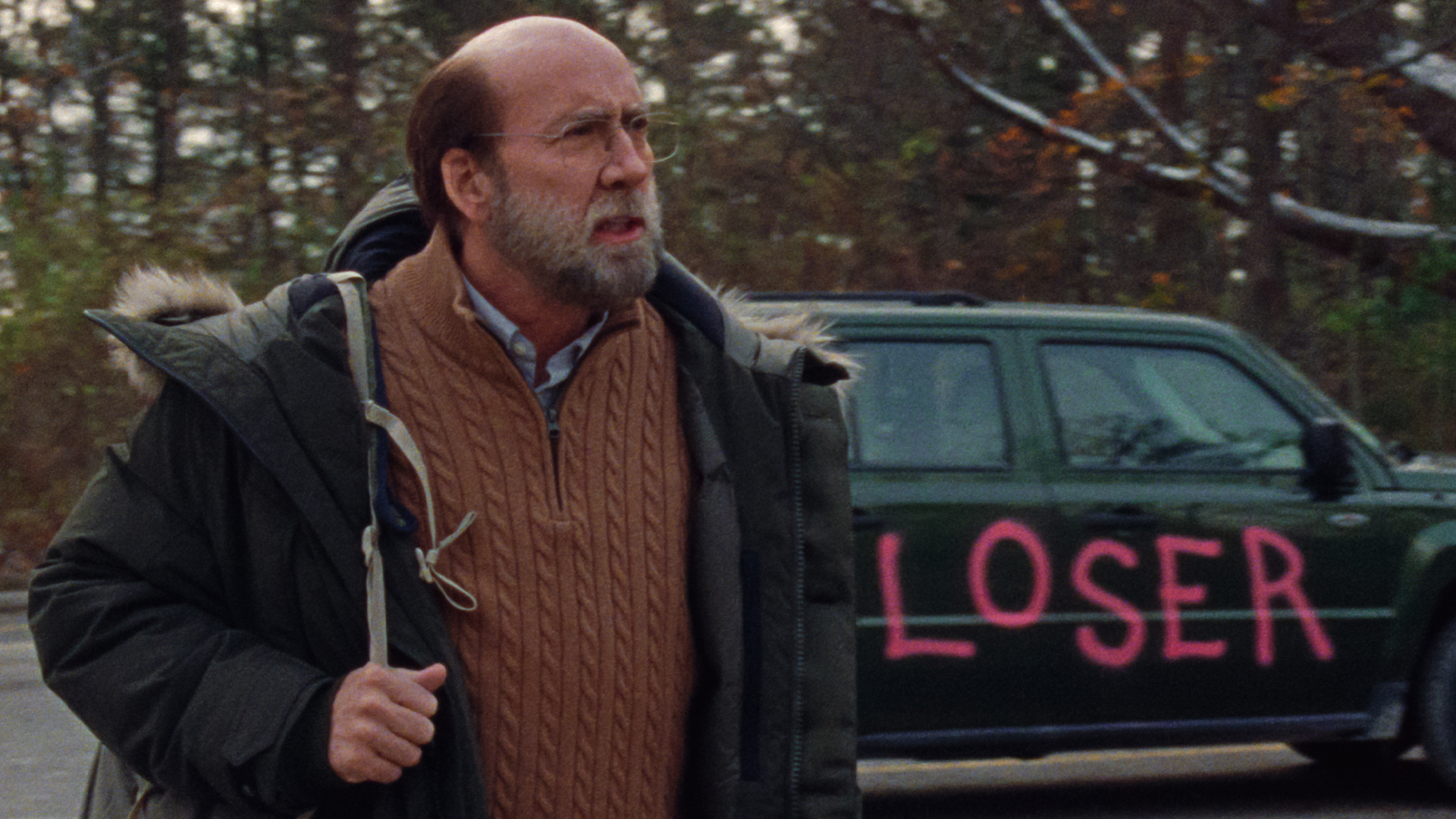In Dream Scenario, Nicolas Cage serves up the stunning performance of (yes) our dreams

Nicolas Cage stars in Dream Scenario as a very average man who, for some unknown reason, frequently appears in other people’s dreams. It’s a film perfectly suited to his talents, writes Rory Doherty.
“I think it was called Nicolas Cage Loses His Shit?” Nic Cage recalled at Dream Scenario’s Toronto premiere, describing his reaction to a fanmade compilation of his biggest, wackiest freakouts on YouTube. It had racked up a gargantuan amount of views, and tons of enthusiastic comments, but he felt like his control over his own image had been taken away from him. These were “cherry-picked”, out-of-context snapshots that aestheticized his acting choices without considering their intent, or how sincerely committed he was to these characters.
Of course, a lot of these clips are still very funny, but the point still stands—a celebrity, especially one who has for a while lived outside pop culture’s limelight, has less say over how their work is understood and appreciated. In one of his strongest performances ever, Nicolas Cage emboldens not just Dream Scenario’s heightened, surreal edge, but its deeply distressing drama too. If an unassuming, insecure narcissist suddenly appeared in everybody’s dreams around the world, surely the eventual result of his celebrity would be bottomless alienation?
Paul Matthews (Cage) is a middling professor who resents his peers’ success and hyper-fixates on his familial inadequacies. When he starts appearing in the dreams of people he knows, and then a lot more people he doesn’t, his narcissism takes over—he’s finally the centre of attention, the recipient of unwarranted praise that he’s convinced he deserves, and is willing to exploit it as much as possible.
He wants a book deal, he wants to be invited to academic dinner parties, he wants to make his students laugh. It’s an important narrative stretch, not only because it’s the only time our protagonist is permitted joy, but because Paul’s inherent narcissism is on full display. Soon, the ugly side of fame inevitably takes over his life—the dreams that rendered Paul as a passive observer to strangers’ subconscious musings soon show him as violent, aggressive, and sadistic.
He suddenly repositions himself as a self-pitying victim, showing a resistance to his celebrity that was absent when it benefited him. Cage shows every step of the journey with exaggerated grace, all the neurotic ticks and fumbling indecision are channelled into a needling braggart who resents not being taken seriously as someone aggrieved.
What are we supposed to read from Dream Scenario’s tale of career-ruining tribulations? Norwegian satirist Kristoffer Borgli is clearly interested in today’s “cancel culture”, and like a lot of recent social satires, the film is a touch too content to pastiche the surface-level observable behaviour around societal phenomenons rather than grappling with the conditions that create political trends or social justice.
It’s difficult to make a real-life comparison with actual academics losing their jobs at the hands of online accountability because, despite real-life professors’ claims that students’ charges were all imagined, they did actually behave in a way that triggered their de-platforming. As we step into a fantasy where none of Paul’s dream behaviour is actually his fault, the choice to adapt a very current and recognisable “wrongful cancellation” narrative feels, when applied wholesale, a bit of an ill fit. In essence, Dream Scenario expects no one in Paul’s world to deal with the situation with even the slightest nuance.
Still, in shifting from dry Scandi satire to American comedy, Borgli finds more fertile ground for comedy and drama than the acerbic distance found in his performance art pastiche Sick of Myself. There’s an unbearable tension to so much of Dream Scenario as characters confront their own subconscious in a real body—a stand-out sequence has a young employee at a PR agency, Molly (Dylan Gelula), explain her unnerving but intense sexual dreams featuring Paul, only to convince him to come back to her apartment to act them out.
Across the imagined and real versions of Molly’s fantasy, we see Cage summon a menace, a patheticism, and, yes, an eroticism that’s nothing short of stunning—which collides head first with Gelula’s commanding portrayal of a young woman actualising a conflicted sexual fantasy. For both of them, fantasy meets reality, and both the dreamer and the dream reckon with Paul’s inability to live up to the imagined version of him.
There’s been such a science to Nicolas Cage’s comeback. Mandy said Cage Rage could be used for serious, artistic genre pictures. Pig reminded us of his sensitive dramatic power. The Unbearable Weight of Massive Talent and Renfield showed us he had a place in mid-budget Hollywood productions, but gave us a deserved degree of caution—are we just going to transfer the meme’d Cage from YouTube to the silver screen?
But two years after Pig, just like clockwork, a project perfectly suited to his talents arose. Dream Scenario isn’t only the type of high-concept, biting comedy that Cage is capable of nailing, but a sincerely distressing and volatile drama that pushes Cage into a broad variety of pathetic, mewling depths—exposing in the process the extent of the male ego’s self-defensive bitterness and woundedness. The film has cancel culture on the brain, but with Cage in the lead, Dream Scenario becomes something more fluid and slippery—a dramatisation of the Venn Diagram that crosses celebrity with neurosis. Spoiler: it’s a circle.
Originally published by Flicks on November 8, 2023



















